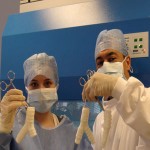Regenerative Medicine: Tissue Engineered Airway Transplant
Regenerative Medicine and the science behind replacing body parts with synthetic tissue engineered versions took another step forwards today after researchers announced they had transplanted a trachea made of a nanomaterial covered with the patient’s own cells.
Researchers from University College London led by Prof. Alexander Seifalian designed and built a polymer based nanocomposite tracheal scaffold, which was then seeded with the patient’s own stem cells.
After two days in a bioreactor (Harvard Bioscience), the cells and the synthetic trachea scaffold were transplanted last month at the Karolinska University Hospital in Stockholm by Prof. Paolo Macchiarini and colleagues, into a patient with late stage tracheal cancer.
As reported by BBC health, and the press releases of University College London (UCL), Karolinska Institute and Harvard Bioscience, the 36 year old man is doing well and because the cells on the trachea were his own, no immunosuppressive drugs were needed.
In the UCL press release, Professor Seifalian said:
“What makes this procedure different is it’s the first time that a wholly tissue engineered synthetic windpipe has been made and successfully transplanted, making it an important milestone for regenerative medicine. We expect there to be many more exciting applications for the novel polymers we have developed.”
While this is still experimental research that needs to be validated in a clinical trial with more subjects, there is the potential for Professor Seifalian’s nanomaterial based tissue scaffold to be used for commercial medical devices such as coronary stents and grafts.
In addition to the development of a nanomaterial that can be used as a tissue scaffold, key to success of the transplant was the ability to grow and cover the engineered material with the patient’s own stem cells. Harvard Bioscience have specifically designed a bioreactor to culture cells onto a graft for airway tissue reengineering.
As innovation in science drives new milestones in regenerative medicine, we can expect the market for tissue engineered products to grow as companies seek regulatory approval for commercial products.
Above all else, regenerative medicine offers major benefits for patients and the restoration of function and improved quality of life. Today’s news is yet another milestone that highlights the promise of regenerative medicine.
